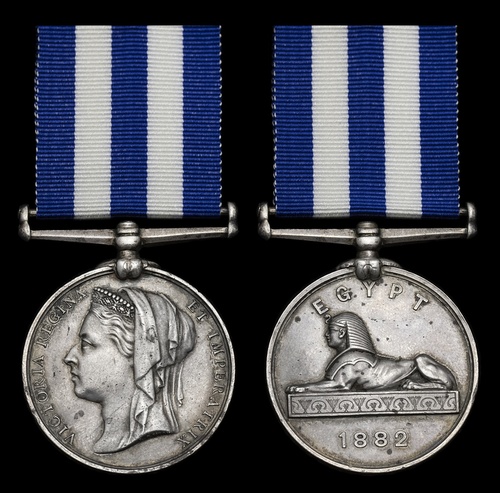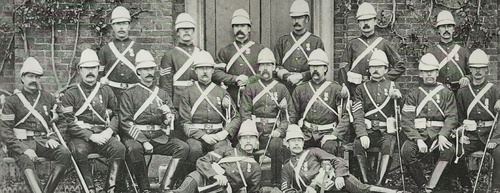Auction: 24003 - Orders, Decorations and Medals
Lot: 250
(x) The Egypt and Sudan Medal awarded to Troop Corporal Major J. G. Davis, 2nd Life Guards, a native of St. Helier, Jersey and the son of a Lieutenant-Colonel, who took part- as an enlisted man in the famous moonlight Charge at Kassassin
Egypt and Sudan 1882-1889, dated reverse, no clasp (456 Tp: Corpl. Maj. J. G. Davis. 2nd Life Gds.), light contact wear overall, very fine
Approximately 60 dated no-clasp Medals to the 2nd Life Guards.
John Gordon Davis was born at St. Helier, Jersey in 1848, the son of Lieutenant-Colonel J. Davis of Beau Voir, St. Helier. He enlisted as a Trooper on 9 May 1866 at London and served at home, being promoted Corporal of Horse on 9 March 1870 and Troop Corporal Major on 14 July 1875. Davis was part of the Squadron selected to join the British expedition to Egypt as part of the composite Household Cavalry Regiment.
Arriving in Egypt on 19 August, the British seized the railway junction of Nifshia and found their enemy dug in along Tel el-Maskhuta. The British artillery hammered them until they withdrew, while the Household Cavalry advanced close on the heals of the retreating enemy. They came upon the Egyptian Camp at Kassassin and took it by surprise, scattering the enemy and securing the canal.
The rest of the Brigade arrived and found themselves confronted by an Egyptian counter-attack in strength on the evening of 28 August. Under-strength it was uncertain that they could hold out, however as night fell the enemy were seen to retire, with their artillery opening up a heavy bombardment to cover the retreat. At this moment the plain before Kassassin was illuminated by a clear moon and the Household Cavalry attacked from the right flank. The enemy withdrawal turned into a rout with some sources stating that they made it through their lines and to the guns, Kassassin was saved and the British advanced onwards.
Further attacks were beaten off and the British grew in strength before advancing against the Egyptian defences at Tel-El-Kebir. The infantry seized the Egyptian defences in a textbook dawn assault, driving them into the open where the Cavalry division, having swung wide, swept in to ride them down. Their actions there completed the victory and scattered the Egyptian Army, ending the campaign.
Davis had been suffering throughout the campaign, having been diagnosed with an abscess which was treated with an incision and poultice. Returning from Egypt on 19 October 1882, he transferred to the Royal Gloucester Hussars Yeomanry on 15 August 1883. Davis was discharged on 4 October 1887 with his intended place of residence listed as Berkeley, Gloucestershire. He died at Parkville, Gladstone Road, Broadstairs on 3 February 1925; sold together with copied census data, service papers and photographs of the 2nd Life Guards in 1883.
Subject to 5% tax on Hammer Price in addition to 20% VAT on Buyer’s Premium.
Sold for
£700
Starting price
£160







